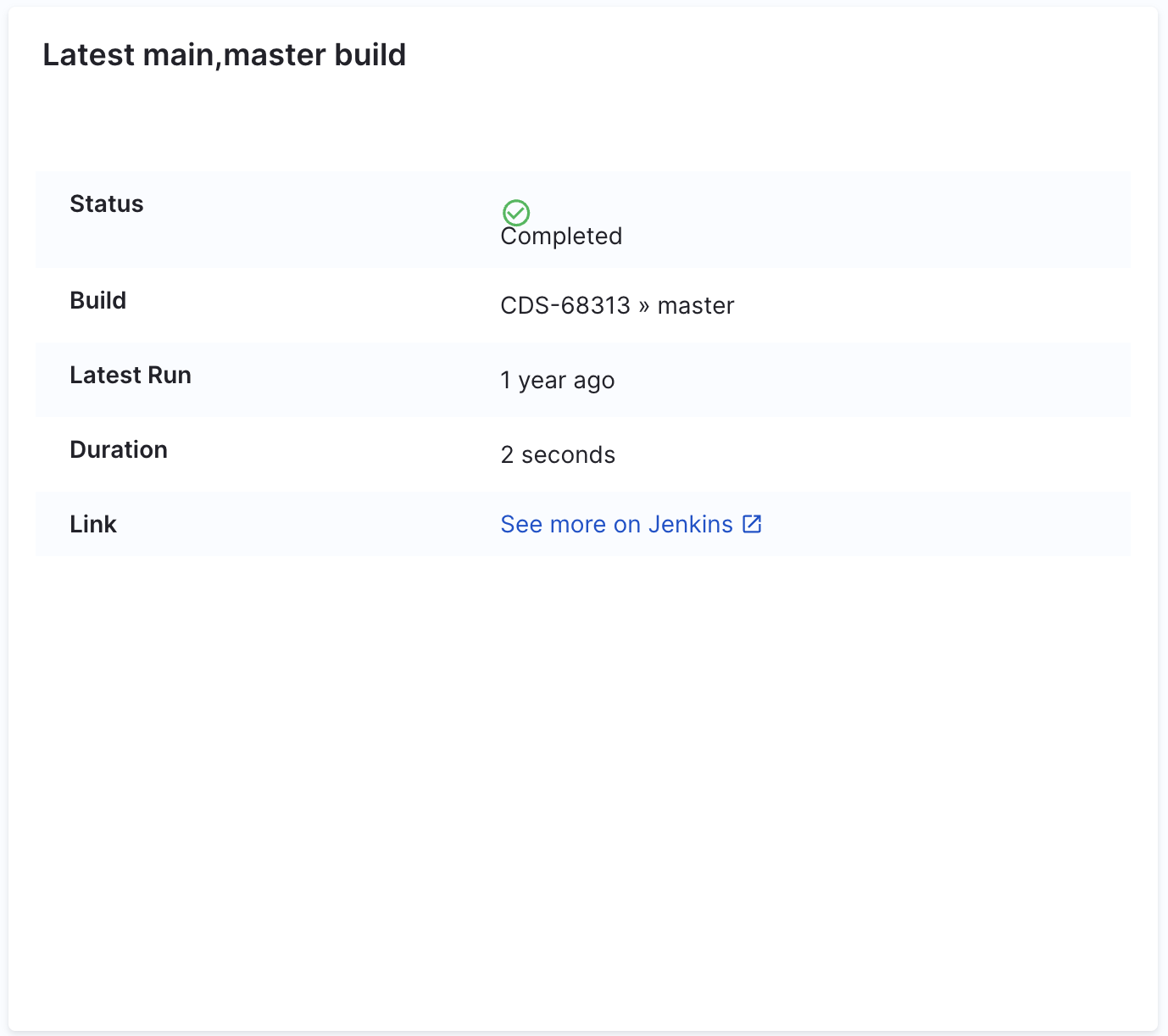Jenkins
| Plugin details | |
|---|---|
| Created by | @timja |
| Category | CI/CD |
| Source | GitHub |
| Type | Open-source plugin |
Configuration
As part of our March-v0.41.0 release, we've upgraded the Jenkins Plugin to its latest version, introducing support for additional parameters in the backend configuration. If you already have the plugin enabled, you can now optionally include these new parameters as needed.
Application Configuration YAML
This plugin requires a backend configuration to make calls to your Jenkins instance with authentication. Update the following configuration with your Jenkins URL and a username:
jenkins:
instances:
- name: default
baseUrl: "<your-jenkins-url>"
username: "<your-jenkins-username>"
apiKey: ${JENKINS_TOKEN}
Additional Parameters
With the latest Jenkins Plugin upgrade, support for additional parameters has been introduced in the backend configuration. You can include these parameters as needed. These parameters serve specific roles in configuring Jenkins instances.
1. projectCountLimit
This parameter sets the maximum number of Jenkins projects (jobs) that the plugin will process or retrieve for a given Jenkins instance. It helps manage performance and load by limiting the number of projects fetched. The projectCountLimit is optional, and if not specified, the default limit is 50.
Example:
jenkins:
baseUrl: https://jenkins.example.com
username: backstage-bot
projectCountLimit: 100
apiKey: 123456789abcdef0123456789abcedf012
In this example, the plugin will process up to 100 projects from the specified Jenkins instance.
2. allowedBaseUrlOverrideRegex
This parameter specifies a regular expression pattern used to securely override the baseUrl defined in the configuration using values from the catalog annotations. This provides flexibility while adding security, ensuring only approved URLs can override the base configuration.
Example Configuration:
Backend Config
jenkins:
instances:
- name: departmentFoo
baseUrl: https://departmentFoo.example.com
username: backstage-bot
projectCountLimit: 100
apiKey: 123456789abcdef0123456789abcedf012
allowedBaseUrlOverrideRegex: https://.*\.example\.com
In this configuration, the allowedBaseUrlOverrideRegex permits URL overrides matching any subdomain of example.com.
Catalog Annotation Example:
apiVersion: backstage.io/v1alpha1
kind: Component
metadata:
name: artist-lookup
annotations:
jenkins.io/job-full-name: departmentFoo:teamA/artistLookup-build
jenkins.io/override-base-url: https://other.example.com
Here, the jenkins.io/override-base-url annotation specifies an alternate Jenkins base URL (https://other.example.com) for this particular entity. The plugin will use this URL if it matches the defined allowedBaseUrlOverrideRegex. The plugin performs validation by ensuring the URL provided matches at least one regex pattern specified in the backend configuration.
Secrets
Since the JENKINS_TOKEN variable is used in the application configuration, you must generate a Jenkins API token and set it as the value of JENKINS_TOKEN.
Delegate proxy
If your Jenkins instance is available on the public internet, this plugin does not require a delegate proxy to work. However, if the Jenkins instance is behind a network firewall, ensure that you have a Harness Delegate running in your network. You can enter the host name or IP address of your Jenkins instance and select the delegate that should have access to the Jenkins instance. The delegate serves as an HTTP proxy for communications between IDP and your Jenkins instance.
Layout
This plugin exports a UI tab that you can use as a new CI/CD tab for a service or for any other layout page. Go to Admin > Layout, select Service in the dropdown menu, and then add the following YAML code in the CI/CD section:
- name: ci-cd
path: /ci-cd
title: CI/CD
contents:
- component: EntitySwitch
specs:
cases:
- if: isJenkinsAvailable
content:
component: EntityJenkinsContent
- content:
component: EmptyState
specs:
props:
title: No CI/CD available for this entity
missing: info
description: You need to add an annotation to your component if you want to enable CI/CD for it. You can read more about annotations in Backstage by clicking the button below.
The isJenkinsAvailable condition is met when the jenkins.io/github-folder annotation is present in the software component's catalog-info.yaml definition file.

Annotations
To configure the plugin for a service in the software catalog, set the following annotation in its catalog-info.yaml definition file:
metadata:
annotations:
jenkins.io/github-folder: "folder-name/project-name"
Support
The plugin is owned by @timja and managed in the Backstage repository as an open-source project. Create a GitHub issue to report bugs or suggest new features for the plugin.